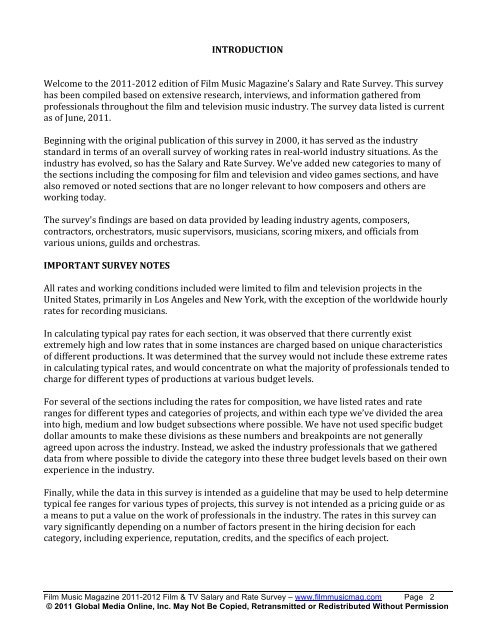Salary Survey 2011-2012 Final - Film Music Network
Salary Survey 2011-2012 Final - Film Music Network
Salary Survey 2011-2012 Final - Film Music Network
You also want an ePaper? Increase the reach of your titles
YUMPU automatically turns print PDFs into web optimized ePapers that Google loves.
INTRODUCTION<br />
Welcome to the <strong>2011</strong>-‐<strong>2012</strong> edition of <strong>Film</strong> <strong>Music</strong> Magazine’s <strong>Salary</strong> and Rate <strong>Survey</strong>. This survey<br />
has been compiled based on extensive research, interviews, and information gathered from<br />
professionals throughout the film and television music industry. The survey data listed is current<br />
as of June, <strong>2011</strong>.<br />
Beginning with the original publication of this survey in 2000, it has served as the industry<br />
standard in terms of an overall survey of working rates in real-‐world industry situations. As the<br />
industry has evolved, so has the <strong>Salary</strong> and Rate <strong>Survey</strong>. We’ve added new categories to many of<br />
the sections including the composing for film and television and video games sections, and have<br />
also removed or noted sections that are no longer relevant to how composers and others are<br />
working today.<br />
The survey's findings are based on data provided by leading industry agents, composers,<br />
contractors, orchestrators, music supervisors, musicians, scoring mixers, and officials from<br />
various unions, guilds and orchestras.<br />
IMPORTANT SURVEY NOTES<br />
All rates and working conditions included were limited to film and television projects in the<br />
United States, primarily in Los Angeles and New York, with the exception of the worldwide hourly<br />
rates for recording musicians.<br />
In calculating typical pay rates for each section, it was observed that there currently exist<br />
extremely high and low rates that in some instances are charged based on unique characteristics<br />
of different productions. It was determined that the survey would not include these extreme rates<br />
in calculating typical rates, and would concentrate on what the majority of professionals tended to<br />
charge for different types of productions at various budget levels.<br />
For several of the sections including the rates for composition, we have listed rates and rate<br />
ranges for different types and categories of projects, and within each type we’ve divided the area<br />
into high, medium and low budget subsections where possible. We have not used specific budget<br />
dollar amounts to make these divisions as these numbers and breakpoints are not generally<br />
agreed upon across the industry. Instead, we asked the industry professionals that we gathered<br />
data from where possible to divide the category into these three budget levels based on their own<br />
experience in the industry.<br />
<strong>Final</strong>ly, while the data in this survey is intended as a guideline that may be used to help determine<br />
typical fee ranges for various types of projects, this survey is not intended as a pricing guide or as<br />
a means to put a value on the work of professionals in the industry. The rates in this survey can<br />
vary significantly depending on a number of factors present in the hiring decision for each<br />
category, including experience, reputation, credits, and the specifics of each project.<br />
<strong>Film</strong> <strong>Music</strong> Magazine <strong>2011</strong>-<strong>2012</strong> <strong>Film</strong> & TV <strong>Salary</strong> and Rate <strong>Survey</strong> – www.filmmusicmag.com Page 2<br />
© <strong>2011</strong> Global Media Online, Inc. May Not Be Copied, Retransmitted or Redistributed Without Permission


